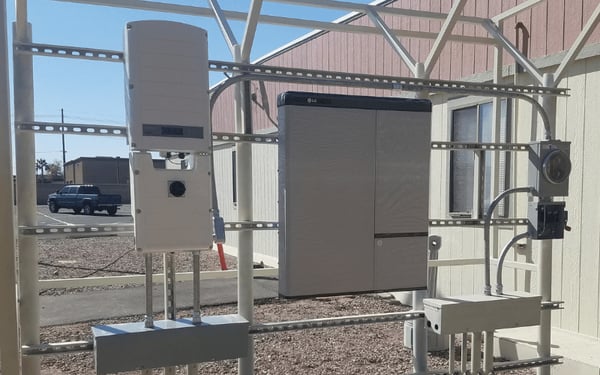Commercial Energy Storage
Solar Power For Commercial Backup & Peak Use
- Home
- Commercial Battery Systems in Arizona | Get a Quote Now
Battery Storage: Secure, Predictable Power
Businesses can suffer significant financial losses when the power goes out. Now that commercial solar has a solid foothold and organizations are realizing tangible savings, many owners and operators are looking for ways to extract even more savings and security from their solar investment.
In addition, most utilities are re-examining their net metering policies and reducing the credits they offer for any excess energy sent back to the grid by your solar energy system. Batteries and other energy storage systems allow you to keep your excess energy when and how you see fit—you don't need to sell it back to the utility at a reduced rate.
Energy Storage Size, Capabilities and ROI

Backup Systems: Power on Standby
As our national energy grid continues to age, more frequent power outages are a certainty. You are more prepared than most if you already have a solar on your business. A commercial energy storage system will allow you to expand security around the clock for your most critical power loads.
An emergency backup system will provide enough energy to run your most critical loads at night while the grid is down for much less money than a full off-grid system. When the sun comes back up the next day, your solar panels will recharge the batteries for use again the following night. This cycle continues until grid power is restored.

Squash Utility Demand Fees
Arizona utilities are moving swiftly toward demand-based rate plans that add new fees for the highest single hour (APS) or half hour (SRP) of energy drawn from the grid during the billing cycle. Energy Storage can help mitigate these fees—allowing your business to flatten demand peaks by drawing from stored solar energy rather than grid energy when your demand peaks.
These systems require much less overall capacity than a full off-grid system and generally offer the fastest ROI.
Introduction to Commercial Solar Battery Storage
Off-Grid Battery System: Unplug from Your Utility
Different types of businesses have vastly different electrical requirements. A manufacturing facility, for example, will use way more electricity than an office complex or church. Providing enough storage capacity to take the office complex completely off-grid is significantly easier and cheaper than supplying 100% of a factory’s electrical needs.
Full off-grid systems typically include energy storage, environmental systems to keep the batteries cool, and generators for additional backup on days with minimal sunlight. As a result, a full off-grid system is generally much more complex and costly than the other two categories listed here.
Peak Shavings
Arizona’s largest utility company charges more per kilowatt-hour during peak demand hours; this is supposed to encourage customers to use less power during those times. As you can imagine, this is not a popular practice.
By incorporating a PowerBank battery system, you can draw stored power during these peak billing times to reduce energy consumption, saving your business money.
Off-Grid
While this option is possible, due to the high costs of massive battery banks it would take to store all the solar energy your business would need, a completely off-the-grid solution might not be a financially smart solution. The return on investment might not be there, but if uninterrupted power and security are your top priority, we will be happy to discuss your off-grid power options.
.webp?width=600&height=402&name=Mask%20group%20(1).webp)

